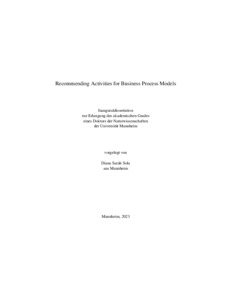|
Recommending activities for business process models
Sola, Diana Sarah
![[img]](https://madoc.bib.uni-mannheim.de/66289/1.hassmallThumbnailVersion/Dissertation_20231213.pdf)  Vorschau |
|
PDF
Dissertation_20231213.pdf
- Veröffentlichte Version
Download (2MB)
|
|
URN:
|
urn:nbn:de:bsz:180-madoc-662894
|
|
Dokumenttyp:
|
Dissertation
|
|
Erscheinungsjahr:
|
2023
|
|
Ort der Veröffentlichung:
|
Mannheim
|
|
Hochschule:
|
Universität Mannheim
|
|
Gutachter:
|
Stuckenschmidt, Heiner
|
|
Sprache der Veröffentlichung:
|
Englisch
|
|
Einrichtung:
|
Fakultät für Wirtschaftsinformatik und Wirtschaftsmathematik > Practical Computer Science II: Artificial Intelligence (Stuckenschmidt 2009-)
|
|
Fachgebiet:
|
004 Informatik
|
|
Freie Schlagwörter (Englisch):
|
activity recommendation , business process models , business process modeling
|
|
Abstract:
|
Business process models are essential artifacts in organizations. They serve as a basis for effective business process management and facilitate communication among various process stakeholders. However, creating these models is a complex task. It requires a combination of domain knowledge and modeling expertise, which is difficult to find in an individual. Moreover, the distributed nature of these modeling settings poses challenges in maintaining consistency and clarity in the resulting models, especially in large-scale modeling initiatives involving thousands of models. These issues have severe consequences, potentially leading to the use of inaccurate, incomplete, or inconsistent models for downstream analyses and managerial decisions. In light of these challenges, this doctoral thesis focuses on recommending activities for business process models to support modelers and enhance their modeling experience. Specifically, it provides the following six key contributions. First, we publish and analyze the largest publicly available collection of business process models. The dataset comprises over one million models in 16 modeling and 41 natural languages, reflecting a high degree of diversity. Second, we propose an explainable activity-recommendation approach based on rules. It uses problem-specific templates for rule learning, which makes it very effective. Third, we explore different approaches to use knowledge graph completion methods for activity recommendation. Our investigations provide valuable insights into the applicability of these methods in a context that differs from traditional benchmarks. Fourth, we develop two approaches for leveraging natural language semantics contained in process models to improve recommendations for models under development that differ significantly from those used for training. One approach extends the rule-based approach with semantic components, while the other is based on a transformer-based language model. Fifth, our transformer-based approach is the first activity-recommendation approach that is able to overcome vocabulary limitations of the models used for training. This enables our approach to better adapt to new recommendation contexts that were not encountered during training. Last, we enhance the framework for evaluating activity-recommendation approaches in terms of evaluated recommendation scenarios, simulation procedures, and metrics.
|
 | Dieser Eintrag ist Teil der Universitätsbibliographie. |
 | Das Dokument wird vom Publikationsserver der Universitätsbibliothek Mannheim bereitgestellt. |
 Suche Autoren in Suche Autoren in
Sie haben einen Fehler gefunden? Teilen Sie uns Ihren Korrekturwunsch bitte hier mit: E-Mail
Actions (login required)
 |
Eintrag anzeigen |
|
|
